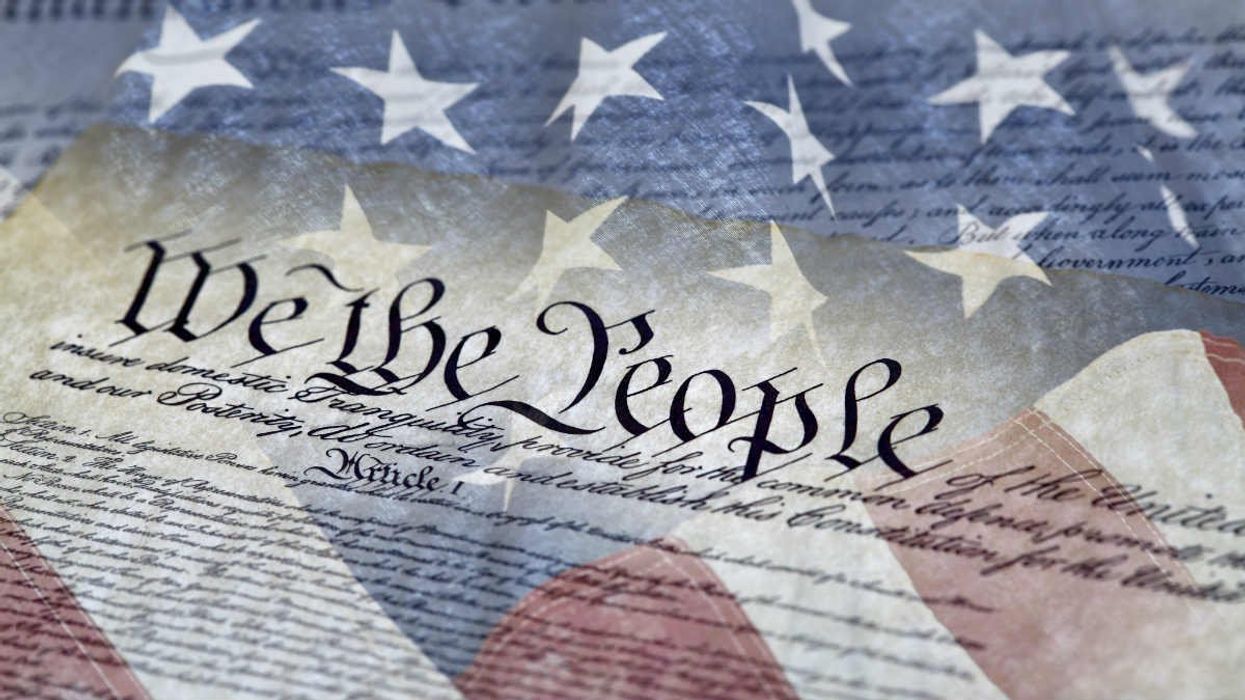
wingedwolf/Getty Images

Democrats are getting desperate. For the first time in a generation, thanks to the power conservatives secured in the House during the speaker debate in January, House Republicans are so far holding the line on a major inflection point. They passed a consensus Republican bill to condition raising the debt ceiling on commonsense reforms, spending cuts, and elimination of the Green New Deal. Democrats thought House Republicans would blink, but they are standing firm as the only body capable of passing a bill. So now a bunch of Democrats are demanding that Biden press the panic button of “invoking the 14th Amendment.” Of course, there is zero constitutional basis for what they are suggesting.
Earlier this week, a group of liberal senators penned a letter to Biden asking him to unilaterally incur more debt by invoking the 14th Amendment’s language that says “the validity of the public debt, authorized by law … shall not be questioned.”
The truth be told, this is nothing new from a group of ideological Marxists who believe an executive can unilaterally regulate anything under the guise of the weather, force you to wear a mask, and cancel all student loan debt. Naturally, they don’t believe in the Constitution and are, therefore, not confined by it. But in case anyone is inclined to fall into their wrong-headed reading of the 14th Amendment, here’s the truth about that clause.
The entirety of the 14th Amendment was in reaction to the Civil War and everything leading up to it, which is why most of it deals with the rights of freed slaves and punishing rebels who served in the Confederate government. Section 4, which they are invoking, is an extension of Section 3 in its design to negate any influence from the Confederate rebels. The amendment’s authors didn’t want future Congresses to nullify the debt incurred to win the Civil War, which was feared as a tool of retaliation for any future pro-Confederate southern representatives who were unhappy with the outcome of the war.
Indeed, this is why the original language of Section 4 actually directly addressed the war. “The obligations of the United States, incurred in suppressing insurrection, or in defense of the Union, or for payment of bounties or pensions incident thereto, shall remain inviolable,” read the original version proposed June 8, 1866.
But regardless of the reason behind this provision, the notion that this amendment gives the president that authority to issue new debt is absurd! It just means the government can’t nullify the debt, which, ironically, is what Democrats want to do today by pretending like the debt doesn’t exist.
Taking the liberal fantasy to its logical conclusion, it would mean that the president has unilateral authority to print money every time he runs out of cash. Of course, anyone who is constitutionally literate knows that one of the exclusive and enumerated authorities granted only to Congress in Art. I, Section 8 is “to borrow Money on the credit of the United States.” The president cannot do that without Congress authorizing a new law. The entire purpose of Article I was to vest the power of the purse, which is the greatest power, in the hands of the many rather than in the hands of one man.
The anti-federalists were even concerned about Congress having power to borrow money and vigorously opposed it. The notion that our founders allowed one man to borrow as much as he wanted is ludicrous. St. George Tucker, in his Blackstone’s Commentaries, observes that Congress’ exclusive power to borrow is “a power inseparably connected with that of raising a revenue,” which is in the preceding clause of Art. 1, Section 8. Therefore, if we are to assume that the president would have a shared pathway to unilaterally borrowing money, that would mean he could also unilaterally raise taxes if he feels we ran out of money!
The irony is that Section 4 was the least debated and least controversial provision of the 14th Amendment. As prime author Representative Thaddeus Stevens said during the floor debate, “I need say nothing of the fourth section, for none dare object to it who is not himself a rebel.”
Obviously, if this section was designed as a blank check to any future president to print money, it would have been very objectionable to anyone in both parties, regardless of their views on the Civil War. Both parties assiduously avoided racking up large amounts of debt as if it were the plague. It wasn’t until World War I that our government began borrowing against its credit in large amounts. Which is why there wasn’t even a need to pass a fixed statutory debt limit until 1939.
In reality, no Democrat will tell you with a straight face that this is what the 14th Amendment means. The same way they cannot suggest that the 14th Amendment, written in 1866, guarantees a right to gay marriage. Their governing philosophy is that they do whatever they want, then backfill their priorities into a contorted reading of the Constitution. They are unconstrained in their pursuit of Marxism. If you want to know the limit to what they are willing to do to you, just demonstrate how much you are willing to tolerate, and that’s how far they will go.Daniel Horowitz
Blaze Podcast Host